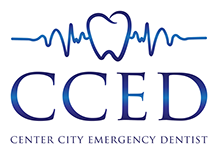Sometimes patients hesitate to get urgent dental care. They assume their issue can wait until morning, when in actuality the sooner they come to us the less lasting damage there will be to their oral health. Waiting to see the dentist can result in greater injuries and pain as well as more expensive restorative dental work in the future, so it’s good to know what is and what isn’t a dental emergency. Here are signs that it’s time for a visit to our urgent dental care office:
- You are bleeding inside your mouth and it won’t stop. This includes injuries to the soft tissues of your mouth, including gums, tongue, and lips.
- Your pain is no longer manageable. Severe pain is a sign of a severe problem, and should be addressed as soon as possible.
- Lost tooth. The sooner you see a dentist after losing a permanent tooth, the greater the chance is they can save it.
Other issues like lost crowns, dental fillings, and a minor chip to your tooth are not usually emergencies. If you aren’t sure if your dental issue is an emergency or not, you can give our office a call and we’ll help you sort it out. Call us at 215-315-7691 and we’ll get you the information and answers that you need. If you’ve decided to wait for an appointment, you can call us for an appointment or request one through our website. We’ll do out best to get you in as soon as possible even if you aren’t an emergency case.
